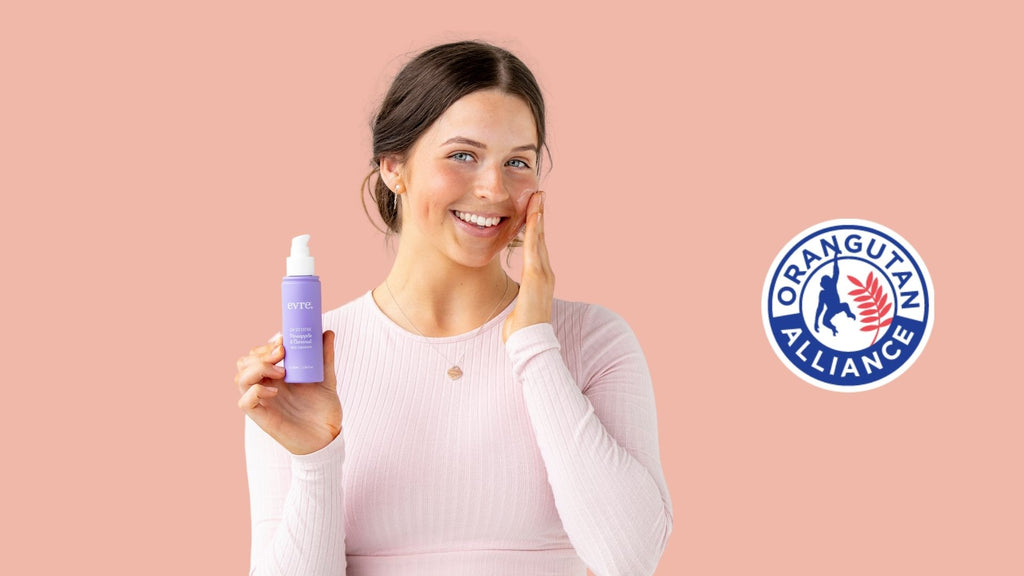Helping end rainforest deforestation
Good skincare makes you feel and look good, it can also do good for the planet. In fact, the ingredients in your face cream may be contributing to rainforest deforestation. And yes, we are talking about palm oil.

Firstly, what is palm oil and why is it so popular?
Palm oil is the most widely consumed vegetable oil in the world. Palm oil is an edible vegetable oil that comes from the fruit of oil palm trees. Palm oil can only be grown in a small part of the world – within 10 degrees of the equator. Malaysia and Indonesia alone cover up to 85% of the world's production of palm oil.
It is very popular because it is an efficient oil crop. It requires half the land that other oil crops use, which makes it cheaper to produce. It is also very versatile, because of this it is used everywhere from chocolate to shampoo and even in cat food!
More than half of the products in your supermarket contain palm oil. In fact, before you’ve left home in the morning, you’ve probably used it many times without realising, from washing your face, styling your hair, eating your breakfast, brushing your teeth and feeding your pet.
If it’s convenient, efficient and uses less land, then what’s the problem?
You remember that time you ate too much junk food? You were sick because it was simply too much, right?
It’s the same with our appetite for products that contain palm oil. We want more and more every year so more palm oil has to be produced, and faster. But like with junk food, there’s a point where too much, is too much and the world has reached that point with palm oil.
Production of palm oil to meet our increasing demand, is no longer sustainable. It simply hurts our planet and its animals.
How are the animals impacted by palm oil production?
As their natural home is robbed from them, the lives of 193 at-risk species such as orangutans, tigers and African forest elephants are threatened. In the past 16 years, half of the Bornean orangutan population has died because of our quest for palm oil. That’s shocking, when you think that until this point, they have been living peacefully for hundreds of years.

But it’s not just the animals
Palm oil is the most widely consumed vegetable oil in the world. Deforestation is also an issue for indigenous populations who are often forced to leave their land to make way for palm oil crops. Can you imagine being forced to leave the place where your family has been living for years just because people somewhere else in the world want more shampoo and chocolate? It sounds unfair, right?
Actually, it is unfair on all of us as we are all impacted by this. Deforestation is achieved by burning down the rainforests, which emits carbon dioxide - a greenhouse gas that is speeding up climate change. In fact, rainforest deforestation is responsible for around 10% of global warming. So, we are all effected.
Farmers are under pressure to produce more palm oil, they are dependent on this work to provide for their families and villages. Finding ways to produce palm oil sustainably is critical so the damaging impact on both our planet, animals and people is limited.
Can we make it sustainable?
Yes, absolutely. But it is not easy as most plantations are in areas where deforestation and farming laws are loose and sustainability is not a priority. But it is doable. Some plantations have already proven that farming can be done sustainably. But to get more farmers to follow sustainable practices, large corporations and companies purchasing palm oil must demand sustainable farming and be ready to pay fair trade prices for it. Government laws and policies also need to be aligned. While the demand for cheaper palm oil production remains, so will the problem.
But it’s not all doom and gloom and there’s been good progress made.
While it is still difficult to trace the sustainability of all ingredients, standards around farming are slowly changing.
The Roundtable on Sustainable Palm Oil (RSPO) was created to connect producers and companies who want to use certified sustainable palm oil. Whilst this is progress, success depends on more brands asking for this certification when choosing their ingredients. It is also reliant on each of us to choose brands that are transparent about sustainability.

Why are we palm free?
We are a small independent brand, so we feel it is a better choice to avoid using palm oil in our products all together.
Transparency is very important to us and we are proud to have a certification from the Orangutan Alliance that confirms that we have worked with our suppliers to use ingredients that are palm oil and palm oil derivative free.
Being palm free costs us more money and time as we have to work harder to seek better alternatives to palm oil. Our formulations too can be more difficult to make, but we think it is worth the effort.
Did you know that you can really help too?
Your evre.day choices have an impact. You can change a lot when you:
- Actively support brands that do not use palm in their products. It starts with what we want. If you demand better, you’ll get better.
- Look out for alternative names for palm - for a full list go here.
- Sponsor an animal threatened by deforestation through a charity like the Orangutan Project.
- Lobby your local government to make labelling of palm mandatory on products so you know when palm oil has been used.
- Join the Unmask Palm Oil movement on Facebook - a group set up to lobby for the mandatory labelling of palm oil on food products (Australia and NZ lags behind the US, Canada and the EU with labelling of vegetable oils on packaging).
- Keep informed. If you want to learn more visit these sites; Greenpeace, Orangutan Alliance, or read this in-depth Guardian article.
